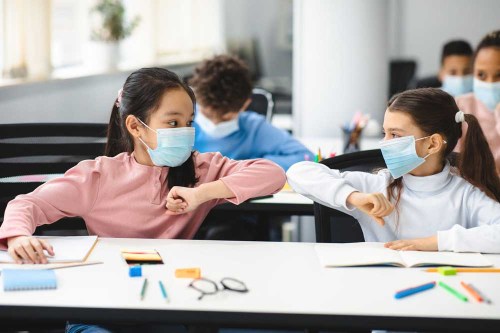20 Oregon teens weigh how to spend $1M to help youth recover from pandemic trauma
Published 12:41 pm Wednesday, September 14, 2022

- student masks
Twenty Oregon teens are working to decide how best to spend $1 million to help fellow youth recover from pandemic-caused emotional, social and economic damage.
So far, the group is homing in on the difficulties students are experiencing in transitioning back to in-person schooling, increased need for mental health care, lessened engagement amid fewer clubs and events, and economic challenges, according to a report issued Wednesday by the Oregon Health Authority. The economic fallout the teens identified includes food insecurity, housing instability and difficulties finding or keeping jobs.
The young people are officially members of the health authority’s new Youth Advisory Council and come from 12 of Oregon’s 36 counties, including six who live in Multnomah County and three in Marion County. All of them identify as members of a group that was disproportionately affected by the pandemic, including people of color, tribal members, people with disabilities and youth in the child welfare system.
Half of them live in a rural or frontier ZIP code. Fifteen of the 20 are still in high school, while the other five graduated this spring and have entered college or the workforce. They were selected by a panel of health authority employees and staff members from partner organizations from the 299 students who applied.
Members are paid $45 an hour for their work unless they opt to receive community service credit instead.
The council meets monthly. By November, it plans to make a formal set of recommendations for how to spend the pandemic aid designated to help youth and schools bounce back.
Its members are: A’ishah Mokrani, Araceli Granados, Brenda Ramirez Gonzalez, Connor Allen, Gabriel Jurado, Ivette Alonso Garcia, Jack Sparks, Jenny Duan, Kate Hawley, Kenney Phillips, Kenzi Haugen, Ndeye Sall, Norah Markham, Sage Waters, Saraya Kathrine Lumbreras, Sasha Shan’te and Sophia Richards.
Portland-based nonprofit Reap Inc. is helping guide the group and providing its members with leadership development.
“Our goal is for students to want to access our services,” Lev Schneidman, program coordinator at the health authority, said in a statement. ”The way to do that is to build our youth-adult partnerships and listen to what youth around Oregon are saying they need right now.”
Anderson DuBoise, strategic initiatives manager at Reap, said he is impressed the teens offer “so much care and passion infused into every conversation about how to better the entirety of our state, not just the larger cities.”





